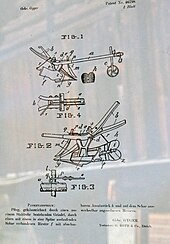Mulin historical workshop
The Historic workshop Mulin ( mulin Romansh for "mill") is an agricultural historic museum in Schnaus in the lower Surselva .
history
In 1871 Arnold Giger-Mühlenbauer (* 1843) came to Schnaus, a blacksmith , mill builder and inventor from Quarten on Lake Walen .
In 1877 he founded today's historical workshop . All historical devices are still functional today and are presented in their mode of action.
The workshop building and the barn are east of the village on the old road to Rueun . Since the buildings were not directly on the stream, a wire rope driven by the water wheel was led over a distance of about 50 meters across the stream down to the workshop, where it powered machines.
The Schnauser plow
The so-called "Schnauser" or "Giger plow" was the most successful. Its peculiarity was that it tore open and swept the earth in a single pass. In addition, due to its iron - wood connection, it was much more robust than the wooden plows that had been used up until then.
The production output was around 50 plows a year. Over the years 2,500–3,000 plows left the forge. They were advertised for sale in the Gasetta Romontscha and then offered for sale in the Ilanz market. In January 1909, Giger's sons patented their father's invention.
revival
In the 1970s, the Schnauser plow experienced a renaissance: the King of Bhutan donated the technologically only slightly modified devices to his farmers. The plows were also used in Bolivia .





